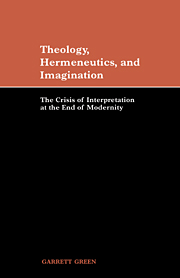Book contents
- Frontmatter
- Contents
- Preface
- 1 Theological hermeneutics in the twilight of modernity
- Part I The modern roots of suspicion
- Part II Christian imagination in a postmodern world
- 6 The hermeneutics of difference: suspicion in postmodern guise
- 7 The hermeneutic imperative: interpretation and the theological task
- 8 The faithful imagination: suspicion and trust in a postmodern world
- Appendix: Hamann's letter to Kraus
- Bibliography
- Index
8 - The faithful imagination: suspicion and trust in a postmodern world
Published online by Cambridge University Press: 22 September 2009
- Frontmatter
- Contents
- Preface
- 1 Theological hermeneutics in the twilight of modernity
- Part I The modern roots of suspicion
- Part II Christian imagination in a postmodern world
- 6 The hermeneutics of difference: suspicion in postmodern guise
- 7 The hermeneutic imperative: interpretation and the theological task
- 8 The faithful imagination: suspicion and trust in a postmodern world
- Appendix: Hamann's letter to Kraus
- Bibliography
- Index
Summary
Crux probat omnia.
LutherBehold, I send you out as sheep in the midst of wolves; so be
wise as serpents and innocent as doves.
Matthew 10.1Throughout the previous chapters I have made use of the historical thesis of Paul Ricoeur, according to which a “hermeneutics of suspicion” – epitomized in the writings of Marx, Freud, and Nietzsche – arose in the nineteenth century and profoundly altered the way in which we read the authoritative texts of our traditions, including the Bible. And in chapter 6 I extended Ricoeur's category to include a postmodern permutation of hermeneutical suspicion, suggesting that Nietzsche can be seen both as the culmination of the modern version and the originator of the postmodern successor. I also indicated briefly in the opening chapter that despite my indebtedness to Ricoeur for his powerful analysis of the modern hermeneutical crisis, I find him a less helpful guide in seeking to respond to it theologically. His own solution could be called a semiotic mysticism, an attempt, as he puts it, to “return to a point that is situated prior to the dichotomy between subject and object” in order to apprehend anew “the manifestation of Being as the logos that gathers all things.” Like Mircea Eliade, Ricoeur is committed to a position that amounts to a kind of natural theology of symbols, one which presupposes a primordial “sacred” reality that manifests itself symbolically in a variety of religious forms.
- Type
- Chapter
- Information
- Theology, Hermeneutics, and ImaginationThe Crisis of Interpretation at the End of Modernity, pp. 187 - 206Publisher: Cambridge University PressPrint publication year: 1999

